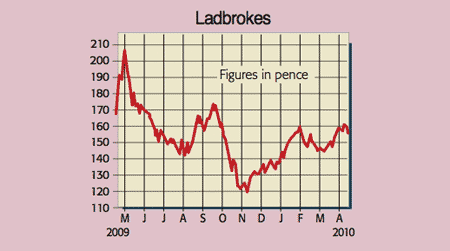
Champion jockey Tony McCoy broke his duck as well as the coffers of many a bookmaker when his steed, Don’t Push It, romped home to win the Aintree Grand National. Estimates put the total win by punters at £50m. Given this sting, why should investors buy Ladbrokes, the UK’s second largest betting chain?
Because this kind of loss is actually good for the industry. With so much press attention, the hefty loss becomes money well spent on free publicity. Also, the hit is just par for the course, and comes after a string of recent winners. For instance, the bookies pocketed £60m after a barnstorming Cheltenham Festival in March. And Tiger Woods’s failure to win at the Augusta Golf Masters saw Ladbrokes banking another £3m.
One of the City’s criticisms of the firm has been its relative underperformance compared with rivals like William Hill. But things are changing. Last month outsider Richard Glynn was appointed as CEO to shake up this sleepy giant. With his talents in the rapidly expanding field of e-gaming, Glynn should be the ideal man to reinvigorate the company’s culture and expand the business – both in the UK and overseas. This has already begun with recent news that Ladbrokes is teaming up with French TV station operator Canal + to launch a new online betting service.
Ladbrokes (LSE: LAD), rated as OVERWEIGHT by Oriel Securities
What’s more, costs are being slashed. Spending has been cut and salaries frozen until January next year. And there’s the added bonus of more bumper paydays from the general election, along with this summer’s football World Cup, which is expected to generate £750m in revenues. Looking forward a couple of years, I believe the group can deliver sustainable operating profit (Ebita) of £300m on £1bn turnover by 2012. Using a ten-times multiple, and after deducting net debt of £694m and discounting back at 12%, one derives an intrinsic worth of around 195p a share.
So what are the wild cards? Clearly, if there’s a double-dip recession, the group would be hit by rising unemployment and lower consumer spending. Also, borrowing levels need to be watched, although with strong cash generation and a debt-to-Ebitda ratio of 2.5 (excluding ‘high rollers’ – gamblers who typically wager five-figure sums), a fund raising looks unlikely. Furthermore, operators are regulated across Europe – there is always a chance that governments will raise taxes, or worse, ban online games as America did in October 2006. All the same, the sector has time and again shown its resilience in providing low-cost entertainment (average bet size is only £8.40) during periods of economic turbulence. With the stock trading on an undemanding 2010 p/e of 11.3 and paying a 4% dividend yield, Ladbrokes looks a tasty wager in light of its turnaround potential. The next trading update is scheduled for 16 May.
Recommendation: BUY at 163p
• Paul Hill also writes a weekly share-tipping newsletter, Precision Guided Investments